#include <stdio.h>#include <string.h>#include <sys/stat.h>#include <sys/types.h>#include <sys/wait.h>#include <errno.h>#include <unistd.h>#include <dirent.h>#include <stdlib.h>#include <ctype.h>#include "problem.h"#include "comm_encode.h"#include "utility.h"
Go to the source code of this file.
Defines | |
| #define | GS_COMPILER_USAGE_STR "Usage: GS_problem_compiler [-k] <IDL Files...>" |
Functions | |
| char * | gs_idl_emit_fortran_ifdefs (FILE *file, char *name, char *lang) |
| char * | gs_idl_arg_name_mangle (gs_argument_t *arg, char *lang, int argnum) |
| int | gs_non_workspace_args_left (gs_argument_t *arg) |
| int | gs_idl_generate_grpc_example (gs_problem_t *problem) |
| int | gs_idl_generate_source (gs_problem_t *problem) |
| int | gs_emit_service_vars (FILE *file, char *bin_name, char *serv_src, char *language, char *libs, char *service) |
| int | gs_emit_service_link (FILE *file, char *parallel, char *language, char *pname) |
| int | gs_idl_generate_makefile (gs_problem_t *problem) |
| int | gs_idl_generate_description (gs_problem_t *problem) |
| int | gs_idl_do_make (gs_problem_t *problem, char *target) |
| int | gs_idl_create_service_dir (char *suffix) |
| int | gs_idl_remove_directory (char *suffix) |
| int | gs_idl_find_arg (gs_problem_t *problem, char *tag, gs_argument_t **found_arg) |
| int | gs_idl_check_dim_expr (gs_problem_t *problem, gs_argument_t *arg) |
| int | gs_idl_check_sparse_mat (gs_problem_t *problem, gs_argument_t *arg) |
| int | gs_idl_check_complexity (gs_problem_t *problem) |
| int | gs_idl_check_problems (gs_problem_t *problemlist) |
| int | gs_idl_compile_problems (gs_problem_t *problemlist) |
| int | gs_idl_parse_and_compile (char *idlfile) |
| int | gs_idl_dump_info (gs_problem_t *problem, char *problemstr) |
| int | gs_idl_compiler_parse_cmd_line (int argc, char **argv, char ***idlfiles, int *remove_failed) |
| int | main (int argc, char *argv[]) |
Variables | |
| char * | gridsolve_root = NULL |
| int | gs_remove_failed_service = TRUE |
Detailed Description
This program processes the specified GridSolve IDL file and creates the necessary service files and builds the service. The files are installed in:
$GRIDSOLVE_ROOT/service/<problem_name>
Definition in file problem_compile.c.
Define Documentation
| #define GS_COMPILER_USAGE_STR "Usage: GS_problem_compiler [-k] <IDL Files...>" |
Function Documentation
| int gs_emit_service_link | ( | FILE * | file, | |
| char * | parallel, | |||
| char * | language, | |||
| char * | pname | |||
| ) |
Definition at line 609 of file problem_compile.c.
{
if(!strcasecmp(parallel, "sequential") && !strcasecmp(language, "C"))
fprintf(file, "%s_LD = $(CCLD)\n", pname);
else if(!strcasecmp(parallel, "sequential")
&& !strcasecmp(language, "FORTRAN"))
fprintf(file, "%s_LD = $(SERVICE_LINK)\n", pname);
else if(!strcasecmp(parallel, "parallel") && !strcasecmp(language, "C"))
fprintf(file, "%s_LD = $(MPICC)\n", pname);
else if(!strcasecmp(parallel, "parallel") && !strcasecmp(language, "C"))
fprintf(file, "%s_LD = $(MPIF77)\n", pname);
fprintf(file, "%s_LINK = $(%s_LD) $(AM_LDFLAGS) $(LDFLAGS) -o $@\n",
pname, pname);
fprintf(file, "%s: $(%s_OBJECTS) $(%s_DEPENDENCIES) \n", pname, pname,
pname);
fprintf(file, "\t$(%s_LINK) $(%s_LDFLAGS) $(%s_OBJECTS) \
$(%s_LDADD) $(LIBS) $(__USER_LIBS)\n", pname, pname, pname, pname);
fprintf(file, "\n");
return 0;
}


| int gs_emit_service_vars | ( | FILE * | file, | |
| char * | bin_name, | |||
| char * | serv_src, | |||
| char * | language, | |||
| char * | libs, | |||
| char * | service | |||
| ) |
Generates the variables for the Makefile.am.
Definition at line 590 of file problem_compile.c.
{
fprintf(file, "%s_SOURCES = %s.c\n", bin_name, serv_src);
fprintf(file, "%s_LDFLAGS = \n", bin_name);
fprintf(file, "%s_OBJECTS = %s.o\n", bin_name, serv_src);
fprintf(file, "%s_DEPENDENCIES = \n", bin_name);
fprintf(file, "%s_LDADD = -L%s/lib -l%s %s/lib/libgridsolve_infrastructure.a \
$(FLIBS) $(LIBS) -lm $(IBPLIB)\n", bin_name, gridsolve_root, service,
gridsolve_root);
fprintf(file, "\n\n");
return 0;
}


| char* gs_idl_arg_name_mangle | ( | gs_argument_t * | arg, | |
| char * | lang, | |||
| int | argnum | |||
| ) |
This generates the proper reference to the given argument. In Fortran all arguments are passed by reference, so we treat them all as pointers. In C if the argument is a scalar and input-only, then it is passed by value and we must dereference the argument pointer.
- Parameters:
-
arg -- The argument to be 'mangled'. lang -- The language in which the routine to be called is implemented. argnum -- The index into the arg array for this argument.
- Returns:
- String representing the reference to the argument. NULL on error.
Definition at line 109 of file problem_compile.c.
{
char *string;
if(!arg || !lang)
return NULL;
if((arg->objecttype == GS_FILE) || (arg->objecttype == GS_PACKEDFILE))
string = dstring_sprintf("(%s *) argdata[%d]",
gs_c_datatype[arg->datatype], argnum);
/* if it's passed by value, dereference before calling */
else if(!strcasecmp(lang, "C") && arg->objecttype == GS_SCALAR &&
((arg->inout == GS_IN) || (arg->inout == GS_WORKSPACE)))
string = dstring_sprintf("(*(%s*)argdata[%d])",
gs_c_datatype[arg->datatype], argnum);
else if(arg->inout == GS_VAROUT)
string = dstring_sprintf("(%s**) argdata[%d]",
gs_c_datatype[arg->datatype], argnum);
else
string = dstring_sprintf("(%s*) argdata[%d]",
gs_c_datatype[arg->datatype], argnum);
return (string);
}


| int gs_idl_check_complexity | ( | gs_problem_t * | problem | ) |
Checks the complexity expression of the specified problem.
- Parameters:
-
problem -- problem which contains the expr to be checked
- Returns:
- 0 on success, -1 on failure.
Definition at line 1239 of file problem_compile.c.
{
icl_list_t *vlist, *l;
char *complexity;
int errors;
errors = 0;
complexity = gs_problem_getinfo(problem, "COMPLEXITY", NULL);
if(!complexity)
return 0;
/* this list holds the names of all the variables used in
* the complexity expression.
*/
vlist = icl_list_new();
if(gs_get_var_list_from_expr(complexity, vlist) < 0) {
ERRPRINTF("Failed to parse complexity expression '%s'\n", complexity);
icl_list_destroy(vlist, free);
return -1;
}
for (l=icl_list_first(vlist); l!=NULL; l=icl_list_next(vlist, l)) {
gs_argument_t *found_arg;
if(gs_idl_find_arg(problem, (char *)l->data, &found_arg) < 0) {
ERRPRINTF("Var '%s' not found. (referenced in complexity '%s')\n",
(char *)l->data, complexity);
errors++;
continue;
}
if(found_arg->objecttype != GS_SCALAR) {
ERRPRINTF("Unsupported use of non-scalar var '%s' in complexity expr\n",
found_arg->name);
errors++;
continue;
}
if((found_arg->datatype != GS_INT) &&
(found_arg->datatype != GS_FLOAT) &&
(found_arg->datatype != GS_DOUBLE) &&
(found_arg->datatype != GS_CHAR))
{
if((found_arg->datatype == GS_SCOMPLEX) ||
(found_arg->datatype == GS_DCOMPLEX))
ERRPRINTF("Unsupported use of complex var '%s' in complexity expr\n",
found_arg->name);
else
ERRPRINTF("Unsupported use of non-numeric var '%s' in complexity expr\n",
found_arg->name);
errors++;
continue;
}
if((found_arg->inout != GS_IN) && (found_arg->inout != GS_INOUT)) {
ERRPRINTF("Var '%s' used in complexity expr should be IN or INOUT\n",
found_arg->name);
errors++;
}
}
icl_list_destroy(vlist, free);
return errors ? -1 : 0;
}
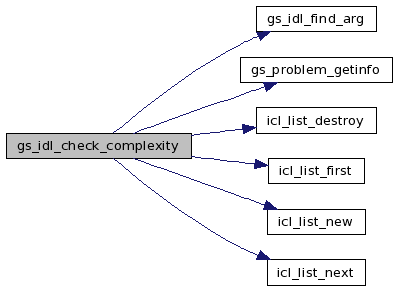

| int gs_idl_check_dim_expr | ( | gs_problem_t * | problem, | |
| gs_argument_t * | arg | |||
| ) |
Checks the dimension expressions of the specified argument. Look for things that can't be caught easily during parsing.
- Parameters:
-
problem -- problem which contains the arg to be checked arg -- pointer to the arg whose dimensions to be checked
- Returns:
- 0 on success, -1 on failure.
Definition at line 1042 of file problem_compile.c.
{
icl_list_t *vlist, *l;
int errors;
errors = 0;
/* this list holds the names of all the variables used in
* the dimension expressions.
*/
vlist = icl_list_new();
if(gs_get_var_list_from_expr(arg->rowexp, vlist) < 0) {
ERRPRINTF("Failed to parse row expression '%s'\n", arg->rowexp);
icl_list_destroy(vlist, free);
return -1;
}
if(gs_get_var_list_from_expr(arg->colexp, vlist) < 0) {
ERRPRINTF("Failed to parse column expression '%s'\n", arg->rowexp);
icl_list_destroy(vlist, free);
return -1;
}
for(l=icl_list_first(vlist); l!=NULL; l=icl_list_next(vlist, l)) {
gs_argument_t *found_arg;
if(gs_idl_find_arg(problem, (char *)l->data, &found_arg) < 0) {
ERRPRINTF("Var '%s' not found. (referenced in size expr of '%s')\n",
(char *)l->data, arg->name);
errors++;
continue;
}
if(found_arg->objecttype != GS_SCALAR) {
ERRPRINTF("Unsupported use of non-scalar var '%s' in dim expr\n",
found_arg->name);
errors++;
continue;
}
if((found_arg->datatype != GS_INT) &&
(found_arg->datatype != GS_FLOAT) &&
(found_arg->datatype != GS_DOUBLE) &&
(found_arg->datatype != GS_CHAR))
{
if((found_arg->datatype == GS_SCOMPLEX) ||
(found_arg->datatype == GS_DCOMPLEX))
ERRPRINTF("Unsupported use of complex var '%s' in dim expr\n",
found_arg->name);
else
ERRPRINTF("Unsupported use of non-numeric var '%s' in dim expr\n",
found_arg->name);
errors++;
continue;
}
/* make sure the variables referenced in the dimension expression
* are IN or INOUT (doesn't apply to VAROUT, FILE, etc).
*/
if((arg->inout == GS_IN) || (arg->inout == GS_INOUT) ||
(arg->inout == GS_OUT) || (arg->inout == GS_WORKSPACE)) {
if((found_arg->inout != GS_IN) && (found_arg->inout != GS_INOUT)) {
ERRPRINTF("Var '%s' used in dim expr should be defined as IN or INOUT\n",
found_arg->name);
errors++;
}
}
else if(arg->inout == GS_VAROUT) {
if(found_arg->inout != GS_OUT) {
ERRPRINTF("Var '%s' in dim expr of a VAROUT should be defined as OUT\n",
found_arg->name);
errors++;
}
}
}
icl_list_destroy(vlist, free);
return errors > 0 ? -1 : 0;
}


| int gs_idl_check_problems | ( | gs_problem_t * | problemlist | ) |
Perform validation tests on all the problems in the specified list.
- Parameters:
-
problem -- list of problems to be checked
- Returns:
- 0 on success, -1 on failure.
Definition at line 1318 of file problem_compile.c.
{
gs_problem_t *problem;
int errors;
errors = 0;
if(!problemlist)
return -1;
for(problem = problemlist; problem != NULL; problem = problem->next) {
gs_argument_t *arg;
for(arg = problem->arglist; arg != NULL; arg = arg->next) {
if(arg->objecttype == GS_SPARSEMATRIX) {
if(gs_idl_check_sparse_mat(problem, arg) < 0)
errors++;
}
if(gs_idl_check_dim_expr(problem, arg) < 0)
errors++;
}
if(gs_idl_check_complexity(problem) < 0)
errors++;
}
return errors ? -1 : 0;
}
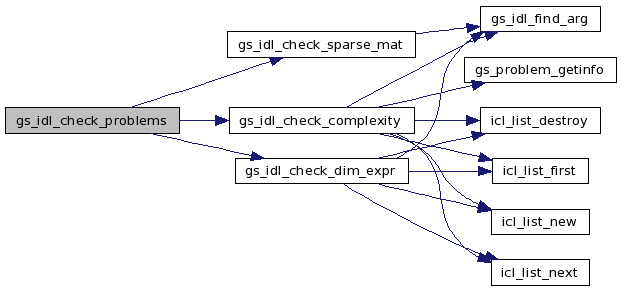

| int gs_idl_check_sparse_mat | ( | gs_problem_t * | problem, | |
| gs_argument_t * | arg | |||
| ) |
Checks the sparse matrix specifications of the given argument.
- Parameters:
-
problem -- problem which contains the arg to be checked arg -- pointer to the arg whose dimensions to be checked
- Returns:
- 0 on success, -1 on failure.
Definition at line 1136 of file problem_compile.c.
{
gs_argument_t *found_arg;
int errors = 0;
if(arg->inout == GS_WORKSPACE) {
ERRPRINTF("WORKSPACE not yet supported for sparse matrices (%s)\n",
arg->name);
errors++;
}
else if(arg->inout == GS_VAROUT) {
ERRPRINTF("VAROUT not yet supported for sparse matrices (%s)\n",
arg->name);
errors++;
}
if(gs_idl_find_arg(problem, arg->sparse_attr.nnzexp, &found_arg) < 0) {
ERRPRINTF("Var '%s' not found. (referenced in NNZ expr of '%s')\n",
arg->sparse_attr.nnzexp, arg->name);
errors++;
}
else {
if(found_arg->objecttype != GS_SCALAR) {
ERRPRINTF("NNZ expr '%s' must be scalar. (referenced in '%s')\n",
found_arg->name, arg->name);
errors++;
}
if(found_arg->datatype != GS_INT) {
ERRPRINTF("NNZ expr '%s' must be integer. (referenced in '%s')\n",
found_arg->name, arg->name);
errors++;
}
if(found_arg->inout != GS_IN) {
ERRPRINTF("NNZ expr '%s' must be IN only. (referenced in '%s')\n",
found_arg->name, arg->name);
errors++;
}
}
if(gs_idl_find_arg(problem, arg->sparse_attr.indices, &found_arg) < 0) {
ERRPRINTF("Var '%s' not found. (referenced in IDX expr of '%s')\n",
arg->sparse_attr.indices, arg->name);
errors++;
}
else {
if(found_arg->objecttype != GS_VECTOR) {
ERRPRINTF("IDX expr '%s' must be a vector. (referenced in '%s')\n",
found_arg->name, arg->name);
errors++;
}
if(found_arg->datatype != GS_INT) {
ERRPRINTF("IDX expr '%s' must be integer. (referenced in '%s')\n",
found_arg->name, arg->name);
errors++;
}
if(found_arg->inout != arg->inout) {
ERRPRINTF("INOUT mode of '%s' and '%s' must match.\n",
found_arg->name, arg->name);
errors++;
}
}
if(gs_idl_find_arg(problem, arg->sparse_attr.pointer, &found_arg) < 0) {
ERRPRINTF("Var '%s' not found. (referenced in PTR expr of '%s')\n",
arg->sparse_attr.pointer, arg->name);
errors++;
}
else {
if(found_arg->objecttype != GS_VECTOR) {
ERRPRINTF("PTR expr '%s' must be a vector. (referenced in '%s')\n",
found_arg->name, arg->name);
errors++;
}
if(found_arg->datatype != GS_INT) {
ERRPRINTF("PTR expr '%s' must be integer. (referenced in '%s')\n",
found_arg->name, arg->name);
errors++;
}
if(found_arg->inout != arg->inout) {
ERRPRINTF("INOUT mode of '%s' and '%s' must match.\n",
found_arg->name, arg->name);
errors++;
}
}
return errors > 0 ? -1 : 0;
}


| int gs_idl_compile_problems | ( | gs_problem_t * | problemlist | ) |
This compiles all the problems in the given problem list.
- Parameters:
-
problemlist -- List of problems to compile.
- Returns:
- 0 on success, -1 on failure.
Definition at line 1358 of file problem_compile.c.
{
gs_problem_t *problem;
if(!problemlist)
return -1;
DBGPRINTF("Compiling problemlist\n");
/* create $GRIDSOLVE_ROOT/service/ */
gs_idl_create_service_dir(NULL);
for(problem = problemlist; problem != NULL; problem = problem->next) {
/* create $GRIDSOLVE_ROOT/service/problem_name */
gs_idl_create_service_dir(problem->name);
if(gs_idl_generate_source(problem) < 0) {
ERRPRINTF("gs_idl_generate_source failed\n");
if(gs_remove_failed_service)
gs_idl_remove_directory(problem->name);
return -1;
}
if(gs_idl_generate_makefile(problem) < 0) {
ERRPRINTF("gs_idl_generate_makefile failed\n");
if(gs_remove_failed_service)
gs_idl_remove_directory(problem->name);
return -1;
}
if(gs_idl_generate_description(problem) < 0) {
ERRPRINTF("gs_idl_generate_description failed\n");
if(gs_remove_failed_service)
gs_idl_remove_directory(problem->name);
return -1;
}
if(gs_idl_generate_grpc_example(problem) < 0) {
ERRPRINTF("Warning: couldn't generate example (probably non-fatal).\n");
}
if(gs_idl_do_make(problem, "install") < 0) {
char * lang;
lang = gs_problem_getinfo(problem, "LANGUAGE", NULL);
if(lang && !strcmp(lang, "FORTRAN")) {
if(gs_idl_do_make(problem, "check_f77") < 0) {
ERRPRINTF("Build failed: probably due to lack of Fortran compiler.\n");
if(gs_remove_failed_service)
gs_idl_remove_directory(problem->name);
/* continue to allow others to complete */
continue;
}
}
ERRPRINTF("gs_idl_do_make failed\n");
if(gs_remove_failed_service)
gs_idl_remove_directory(problem->name);
return -1;
}
if(gs_problem_getinfo(problem, "BATCH_SUBMIT", NULL) &&
gs_problem_getinfo(problem, "BATCH_PROBE", NULL) &&
gs_problem_getinfo(problem, "BATCH_CANCEL", NULL))
{
if(gs_idl_do_make(problem, "gs_copy_batch_scripts") < 0) {
ERRPRINTF("gs_idl_do_make failed\n");
if(gs_remove_failed_service)
gs_idl_remove_directory(problem->name);
return -1;
}
}
}
return 0;
}
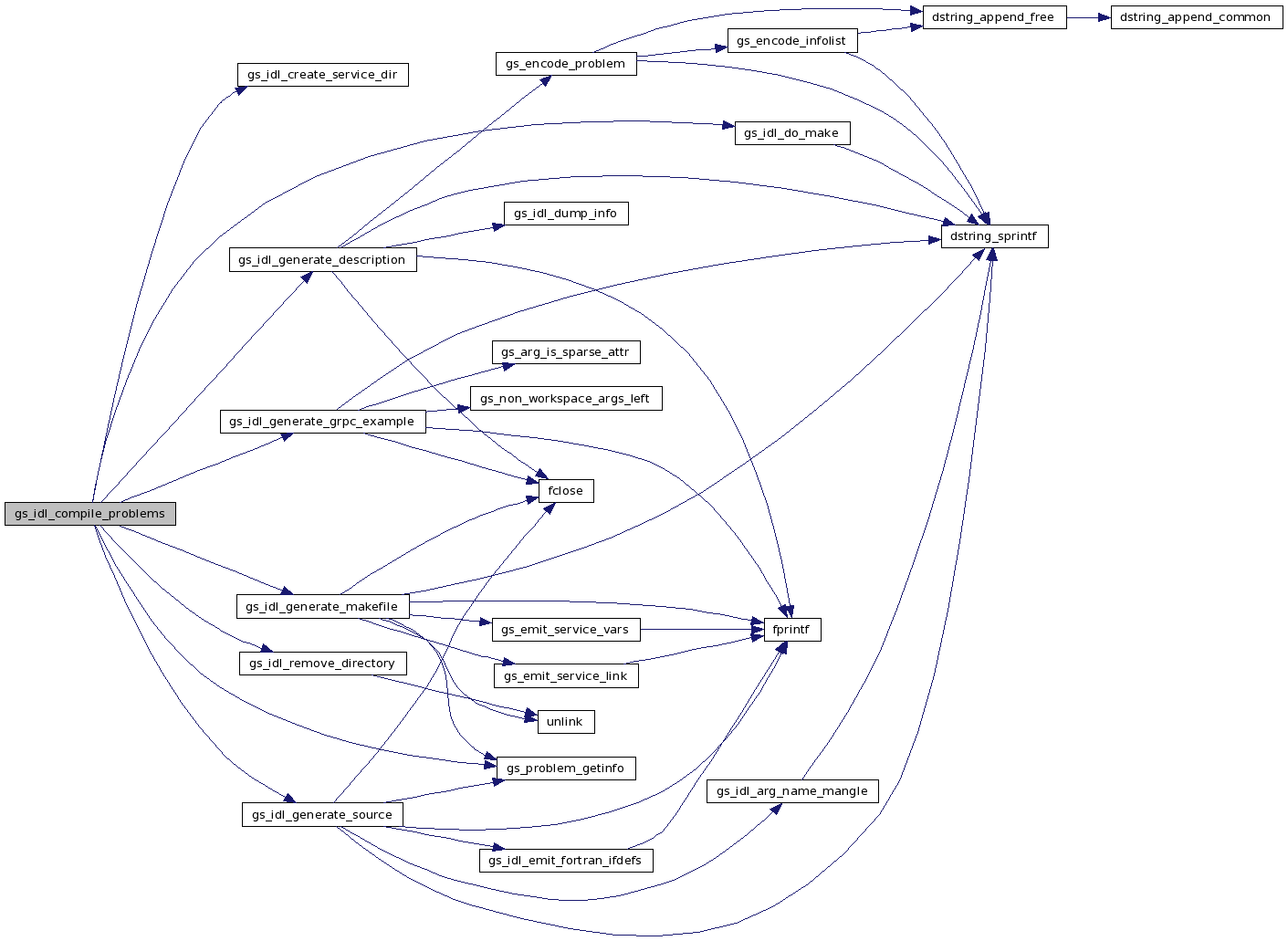

| int gs_idl_compiler_parse_cmd_line | ( | int | argc, | |
| char ** | argv, | |||
| char *** | idlfiles, | |||
| int * | remove_failed | |||
| ) |
Parse the command line for flags passed to the problem compiler. Currently the syntax is: GS_problem_compiler [-k] <IDL Files...>
- Parameters:
-
argc -- arg count argv -- array of arguments idlfiles -- pointer to array of strings. upon return, this will be allocated to contain an array of non-option arguments (i.e. the names of the IDL files to be compiled). the last entry will be NULL. remove_failed -- upon return, set to 1 if failed builds should be removed, 0 otherwise.
- Returns:
- 0 if the args parsed successfully, -1 otherwise.
Definition at line 1521 of file problem_compile.c.
{
int c;
*remove_failed = 1;
/* when making changes to the command line args, update
* GS_COMPILER_USAGE_STR so the usage information is printed
* correctly upon error.
*/
#define GS_COMPILER_USAGE_STR \
"Usage: GS_problem_compiler [-k] <IDL Files...>"
while((c = getopt(argc,argv,"k")) != EOF) {
switch(c) {
case 'k':
*remove_failed = 0;
break;
case '?':
return -1;
break;
default:
ERRPRINTF("Bad arg: '%c'.\n",c);
return -1;
}
}
*idlfiles = (char **)malloc((argc - optind + 1) * sizeof(char *));
if(!*idlfiles)
return -1;
for (c = optind; c < argc; c++) {
(*idlfiles)[c-optind] = strdup(argv[c]);
if(!(*idlfiles)[c-optind])
return -1;
}
(*idlfiles)[argc-optind] = NULL;
return 0;
}

| int gs_idl_create_service_dir | ( | char * | suffix | ) |
This function creates a service directory with the prefix: $GRIDSOLVE_ROOT/service Optionally a suffix can be specified, in which case the following directory will be created: $GRIDSOLVE_ROOT/service/<suffix>
- Parameters:
-
suffix -- Directory name to append to the default. suffix may be NULL.
- Returns:
- 0 on success, -1 on failure.
Definition at line 891 of file problem_compile.c.
{
char *fname;
struct stat stbuf;
fname = calloc((strlen(gridsolve_root) + strlen("/service/") +
+ (suffix ? strlen(suffix) + 1 : 0) + 1), sizeof(char));
sprintf(fname, "%s", gridsolve_root);
/* if the directory doesn't exist, try to create it */
if(stat(fname, &stbuf) < 0)
if(mkdir(fname, 0755) < 0)
return -1;
sprintf(fname, "%s/service%s%s", gridsolve_root,
suffix ? "/" : "", suffix ? suffix : "");
/* if the directory doesn't exist, try to create it */
if(stat(fname, &stbuf) < 0)
if(mkdir(fname, 0755) < 0)
return -1;
free(fname);
return 0;
}

| int gs_idl_do_make | ( | gs_problem_t * | problem, | |
| char * | target | |||
| ) |
This creates the problem service, which is used to call the user's routine. Before calling this function, the Makefile should have been created since we will run make from here to build the service.
- Parameters:
-
problem -- The problem struct representing the routine to be called.
- Returns:
- 0 on success, -1 on failure.
Definition at line 839 of file problem_compile.c.
{
char *command;
int status;
if(!problem)
return -1;
DBGPRINTF("Executing makefile for %s\n", problem->name);
command =
dstring_sprintf("cd \"%s/service/%s\"; make -f %s_makefile %s",
gridsolve_root, problem->name,
problem->name, target);
if(!command) {
ERRPRINTF("Error creating command to build target = '%s'\n", target);
goto gs_idl_do_make_error;
}
DBGPRINTF("Make command: %s\n", command);
status = system(command);
if((status < 0) || (WEXITSTATUS(status) != 0)) {
ERRPRINTF("Error building problem (%s), target = '%s'\n", command, target);
goto gs_idl_do_make_error;
}
free(command);
return 0;
gs_idl_do_make_error:
if(command)
free(command);
return -1;
}


| int gs_idl_dump_info | ( | gs_problem_t * | problem, | |
| char * | problemstr | |||
| ) |
Primarily for debugging, this dumps a lot of information about the problem to the console.
- Parameters:
-
problem -- The problem struct representing the routine to be called. problemstr -- The XML string representing this problem.
- Returns:
- 0 on success, -1 on failure.
Definition at line 1493 of file problem_compile.c.
{
if(!problem || !problemstr)
return -1;
DBGPRINTF("Dumping the xml\n %s\n", problemstr);
return 0;
}

| char* gs_idl_emit_fortran_ifdefs | ( | FILE * | file, | |
| char * | name, | |||
| char * | lang | |||
| ) |
This returns the proper name to use when the service calls the routine. When calling from C to Fortran we need to append "_" to the name.
- Parameters:
-
name -- The name of the problem. lang -- The language in which the routine to be called is implemented. Must be either "C" or "FORTRAN" (case insensitive).
- Returns:
- The modified name. Returns NULL on error.
Definition at line 52 of file problem_compile.c.
{
if(!name || !lang)
return NULL;
if(!strcasecmp(lang, "FORTRAN")) {
char *lo, *up;
int i;
lo = strdup(name);
if(!lo) return NULL;
up = strdup(name);
if(!up) {
free(lo);
return NULL;
}
for(i=0;i<strlen(name);i++) {
lo[i] = tolower(lo[i]);
up[i] = toupper(up[i]);
}
fprintf(file, "#ifdef F2CNOCHANGE\n");
fprintf(file, "#define GS_USER_ROUTINE %s\n", lo);
fprintf(file, "#elif F2CADD_\n");
fprintf(file, "#define GS_USER_ROUTINE %s_\n", lo);
fprintf(file, "#elif F2CADD__\n");
fprintf(file, "#define GS_USER_ROUTINE %s__\n", lo);
fprintf(file, "#elif F2CUPCASE\n");
fprintf(file, "#define GS_USER_ROUTINE %s\n", up);
fprintf(file, "#else\n");
fprintf(file, "#define GS_USER_ROUTINE %s\n", lo);
fprintf(file, "#endif\n");
fprintf(file, "\n");
return strdup("GS_USER_ROUTINE");
}
return strdup(name);
}


| int gs_idl_find_arg | ( | gs_problem_t * | problem, | |
| char * | tag, | |||
| gs_argument_t ** | found_arg | |||
| ) |
Finds an argument with the specified name in the problem struct.
- Parameters:
-
problem -- pointer to the problem struct to search tag -- name of the argument to find found_arg -- set upon return to be a pointer to the found argument. set to NULL if not found.
- Returns:
- 0 on success, -1 on failure.
Definition at line 1015 of file problem_compile.c.
{
gs_argument_t *f;
int found = 0;
for(f = problem->arglist; f; f = f->next)
if(!strcmp(f->name, tag)) {
found = 1;
break;
}
*found_arg = found ? f : NULL;
return found ? 0 : -1;
}

| int gs_idl_generate_description | ( | gs_problem_t * | problem | ) |
This generates the XML problem description which will be used by the client to determine the calling sequence and send the correct argument sizes, etc.
- Parameters:
-
problem -- The problem struct representing the routine to be called.
- Returns:
- 0 on success, -1 on failure.
Definition at line 780 of file problem_compile.c.
{
char *fname = NULL;
FILE *file = NULL;
char *problemstr = NULL;
if(!problem)
return -1;
DBGPRINTF("Generating description %s\n", problem->name);
fname = dstring_sprintf("%s/service/%s/%s.xml",
gridsolve_root, problem->name,
problem->name);
if(!fname) {
ERRPRINTF("Error generating xml service desc name.\n");
return -1;
}
DBGPRINTF("Creating problem description in %s\n", fname);
if((file = fopen(fname, "w")) == NULL) {
ERRPRINTF("Error creating problem description file '%s'.\n", fname);
free(fname);
return -1;
}
free(fname);
DBGPRINTF("Encoding problem to string\n");
if(gs_encode_problem(&problemstr, problem) < 0) {
ERRPRINTF("Failed to encode problem.\n");
return -1;
}
DBGPRINTF("Problem description: %s\n", problemstr);
fprintf(file, "%s\n", problemstr);
#ifdef GS_DEBUG
gs_idl_dump_info(problem, problemstr);
#endif
free(problemstr);
fclose(file);
return 0;
}


| int gs_idl_generate_grpc_example | ( | gs_problem_t * | problem | ) |
Generates an example of how this problem would be called from a GridRPC client.
- Parameters:
-
problem -- The problem to be called.
- Returns:
- 0 on success, -1 on failure.
Definition at line 170 of file problem_compile.c.
{
gs_argument_t *arg;
char *fname;
FILE *file;
int needs_scval = 0, needs_dcval = 0;
fname = dstring_sprintf("%s/service/%s/%s_grpc_example.c",
gridsolve_root, problem->name,
problem->name);
if(!fname) {
ERRPRINTF("Could not generate name of service file\n");
return -1;
}
if((file = fopen(fname, "w")) == NULL) {
ERRPRINTF("Could not open file %s\n", fname);
free(fname);
return -1;
}
free(fname);
/* first generate the typical header stuff */
fprintf(file, "/* This is an automatically generated code example, so\n");
fprintf(file, " * arguments are initialized with some arbitrary values\n");
fprintf(file, " * that may not be valid for the routine. It is just\n");
fprintf(file, " * intended to show the proper calling sequence (whether\n");
fprintf(file, " * arguments should be passed by reference, how\n");
fprintf(file, " * they could be declared, etc) and simple GridRPC\n");
fprintf(file, " * initialization, calling, and error handling.\n");
fprintf(file, " */\n");
fprintf(file, "\n");
fprintf(file, "#include <stdio.h>\n");
fprintf(file, "#include <stdlib.h>\n");
fprintf(file, "\n");
fprintf(file, "#undef max\n");
fprintf(file, "#define max(a, b) (((a) > (b)) ? (a) : (b))\n");
fprintf(file, "\n");
fprintf(file, "#undef min\n");
fprintf(file, "#define min(a, b) (((a) < (b)) ? (a) : (b))\n");
fprintf(file, "\n");
fprintf(file, "\n");
fprintf(file, "#include \"grpc.h\"\n");
fprintf(file, "\n");
fprintf(file, "int main()\n");
fprintf(file, "{\n");
fprintf(file, " grpc_function_handle_t __handle;\n");
fprintf(file, " grpc_error_t __status;\n");
/* now generate local variable declarations for the args */
for(arg = problem->arglist; arg != NULL; arg = arg->next) {
/* skip workspace args */
if(arg->inout == GS_WORKSPACE)
continue;
fprintf(file, " %s ", gs_c_datatype[arg->datatype]);
if((arg->objecttype == GS_VECTOR) || (arg->objecttype == GS_MATRIX)
|| (arg->objecttype == GS_SPARSEMATRIX) || (arg->objecttype == GS_FILE))
fprintf(file, "*");
else if(arg->objecttype == GS_PACKEDFILE)
fprintf(file, "**");
fprintf(file, "%s;\n", arg->name);
if(arg->datatype == GS_SCOMPLEX)
needs_scval = 1;
if(arg->datatype == GS_DCOMPLEX)
needs_dcval = 1;
}
if(needs_scval)
fprintf(file, " %s __scval = {4.0, 6.0};\n", gs_c_datatype[GS_SCOMPLEX]);
if(needs_dcval)
fprintf(file, " %s __dcval = {4.0, 6.0};\n", gs_c_datatype[GS_DCOMPLEX]);
fprintf(file, "\n");
/* initialize scalar arguments */
for(arg = problem->arglist; arg != NULL; arg = arg->next) {
/* skip workspace args */
if(arg->inout == GS_WORKSPACE)
continue;
/* skip this if it's a sparse matrix attribute */
if(gs_arg_is_sparse_attr(arg->name, problem->arglist))
continue;
if((arg->objecttype == GS_SCALAR) && (arg->inout != GS_OUT))
fprintf(file, " %s = %s;\n", arg->name, gs_const[arg->datatype]);
else if(arg->objecttype == GS_FILE)
fprintf(file, " %s = \"foo\";\n", arg->name);
}
/* for non-scalar args we must allocate memory */
for(arg = problem->arglist; arg != NULL; arg = arg->next) {
/* skip workspace args */
if(arg->inout == GS_WORKSPACE)
continue;
/* skip this if it's a sparse matrix attribute */
if(gs_arg_is_sparse_attr(arg->name, problem->arglist))
continue;
if((arg->objecttype == GS_VECTOR) || (arg->objecttype == GS_MATRIX)
|| (arg->objecttype == GS_PACKEDFILE))
fprintf(file, " %s = (%s %s)malloc((%s)*(%s)*sizeof(*%s));\n", arg->name,
gs_c_datatype[arg->datatype],
arg->objecttype == GS_PACKEDFILE ? "**" : "*",
arg->rowexp, arg->colexp, arg->name);
}
for(arg = problem->arglist; arg != NULL; arg = arg->next) {
/* skip this if it's a sparse matrix attribute */
if(gs_arg_is_sparse_attr(arg->name, problem->arglist))
continue;
if(((arg->objecttype == GS_VECTOR) || (arg->objecttype == GS_MATRIX))
&& (arg->inout != GS_OUT) && (arg->inout != GS_WORKSPACE)) {
fprintf(file, " {\n int __i;\n");
fprintf(file, " for(__i=0;__i<(%s)*(%s);__i++)\n", arg->rowexp,
arg->colexp);
fprintf(file, " %s[__i] = %s;\n", arg->name,
gs_const[arg->datatype]);
fprintf(file, " }\n");
}
else if(arg->objecttype == GS_PACKEDFILE) {
fprintf(file, " {\n int __i;\n");
fprintf(file, " for(__i=0;__i<(%s);__i++)\n", arg->rowexp);
fprintf(file, " %s[__i] = \"foo\";\n", arg->name);
fprintf(file, " }\n");
}
else if(arg->objecttype == GS_SPARSEMATRIX) {
fprintf(file, "\n /* initialize sparse matrix %s */\n", arg->name);
fprintf(file, " if((%s = gs_gen_sparse_mat_%s(%s, (0*%s)+1, (1*%s)-1 , &%s, &%s, &%s)) < 0) {\n",
arg->sparse_attr.nnzexp, gs_c_datatype[arg->datatype], arg->colexp,
arg->rowexp, arg->rowexp, arg->name, arg->sparse_attr.indices,
arg->sparse_attr.pointer);
fprintf(file, " fprintf(stderr,\"Error creating sparse matrix\\n\");\n");
fprintf(file, " exit(EXIT_FAILURE);\n");
fprintf(file, " }\n");
}
}
fprintf(file, "\n");
/* generate a call to initialize GRPC */
fprintf(file, " if(grpc_initialize(NULL) != GRPC_NO_ERROR) {\n");
fprintf(file, " grpc_perror(\"grpc_initialize\");\n");
fprintf(file, " exit(EXIT_FAILURE);\n");
fprintf(file, " }\n");
fprintf(file, "\n");
/* create the GRPC function handle to the function we want to call */
fprintf(file,
" if(grpc_function_handle_default(&__handle, \"%s\") != GRPC_NO_ERROR) {\n",
problem->name);
fprintf(file,
" fprintf(stderr,\"Error creating function handle\\n\");\n");
fprintf(file, " exit(EXIT_FAILURE);\n");
fprintf(file, " }\n");
/* start generating the actual call */
fprintf(file, " __status = grpc_call(&__handle,");
for(arg = problem->arglist; arg != NULL; arg = arg->next) {
/* skip workspace args */
if(arg->inout == GS_WORKSPACE)
continue;
/* if this is a scalar passed by reference, pass the address */
if(((arg->objecttype == GS_SCALAR) && (arg->inout != GS_IN)) ||
(arg->inout == GS_VAROUT))
fprintf(file, "&");
fprintf(file, "%s", arg->name);
if(!gs_non_workspace_args_left(arg))
fprintf(file, ",");
}
fprintf(file, ");\n\n");
/* call is complete, check the status */
fprintf(file, " if(__status != GRPC_NO_ERROR) {\n");
fprintf(file, " printf(\"GRPC error __status = %%d\\n\", __status);\n");
fprintf(file, " grpc_perror(\"grpc_call\");\n");
fprintf(file, " exit(__status);\n");
fprintf(file, " }\n");
fprintf(file, "\n printf(\"GridRPC call completed successfully.\\n\");\n");
/* we are done. finalize */
fprintf(file, " grpc_finalize();\n");
fprintf(file, " exit(EXIT_SUCCESS);\n");
fprintf(file, "}\n");
fclose(file);
return 0;
}
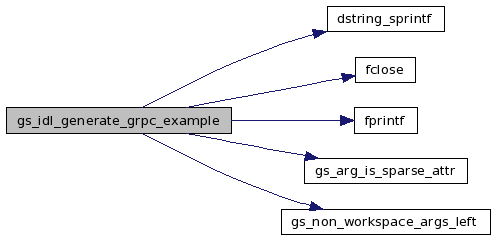

| int gs_idl_generate_makefile | ( | gs_problem_t * | problem | ) |
This generates the Makefile which will be used to build the service and link in the user's code.
- Parameters:
-
problem -- The problem struct representing the routine to be called.
- Returns:
- 0 on success, -1 on failure.
Definition at line 642 of file problem_compile.c.
{
char *fname, *language, *parallel, *libs, *pname, *bname, *grpc_pname;
char *submit_script, *probe_script, *cancel_script, *linker;
gs_info_t *info;
int batch_mode;
FILE *file;
submit_script = gs_problem_getinfo(problem, "BATCH_SUBMIT", NULL);
probe_script = gs_problem_getinfo(problem, "BATCH_PROBE", NULL);
cancel_script = gs_problem_getinfo(problem, "BATCH_CANCEL", NULL);
if(submit_script && probe_script && cancel_script)
batch_mode = 1;
else if(!submit_script && !probe_script && !cancel_script)
batch_mode = 0;
else {
ERRPRINTF("If using batch mode, BATCH_SUBMIT, BATCH_PROBE, and BATCH_CANCEL must all be specified.\n");
return -1;
}
if(!problem)
return -1;
DBGPRINTF("Generating makefile %s\n", problem->name);
language = gs_problem_getinfo(problem, "LANGUAGE", "C");
parallel = gs_problem_getinfo(problem, "PARALLEL", "sequential");
linker = gs_problem_getinfo(problem, "LINKER", NULL);
libs = gs_problem_getinfo(problem, "LIBS", "");
fname = dstring_sprintf("%s/service/%s/%s_makefile",
gridsolve_root, problem->name,
problem->name);
if(!fname) {
ERRPRINTF("Error generating the name of the makefile\n");
return -1;
}
unlink(fname);
if((file = fopen(fname, "w")) == NULL) {
ERRPRINTF("Could not open file '%s'\n", fname);
free(fname);
return -1;
}
free(fname);
pname = dstring_sprintf("%s_service", problem->name);
if(!pname) {
ERRPRINTF("Error generating the name of the service\n");
return -1;
}
gs_emit_service_vars(file, pname, pname, language, libs, "gsservice_template");
if(batch_mode) {
bname = dstring_sprintf("%s_batch_service", problem->name);
if(!bname) {
ERRPRINTF("Error generating the name of the service\n");
return -1;
}
gs_emit_service_vars(file, bname, pname, language, libs, "gsbatch_template");
}
else
bname = "";
grpc_pname = dstring_sprintf("%s_grpc_example", problem->name);
if(!grpc_pname) {
ERRPRINTF("Error generating the name of the service\n");
free(pname);
return -1;
}
gs_emit_service_vars(file, grpc_pname, grpc_pname, language, libs, "gsservice_template");
fprintf(file, "bin_PROGRAMS = %s %s %s\n", pname, grpc_pname, bname);
fprintf(file, "\n");
fprintf(file, "include ../template_problem/Makefile.inc\n");
for(info = problem->infolist; info != NULL; info = info->next) {
if(!strcmp(info->type, "LIBS"))
fprintf(file, "__USER_LIBS=%s\n", info->value);
else
fprintf(file, "%s=%s\n", info->type, info->value);
}
if(!strcmp(gridsolve_root, GRIDSOLVE_TOP_BUILD_DIR))
fprintf(file, "INCLUDES = -I%s/include -I%s/include $(IBP_INCDIR)\n", GRIDSOLVE_TOP_BUILD_DIR, GRIDSOLVE_TOP_SRC_DIR);
else
fprintf(file, "INCLUDES = -I%s/include $(IBP_INCDIR)\n", gridsolve_root);
fprintf(file, "\n");
if(linker)
fprintf(file, "CCLD=%s\n", linker);
gs_emit_service_link(file, parallel, language, pname);
gs_emit_service_link(file, parallel, language, grpc_pname);
if(batch_mode) {
gs_emit_service_link(file, parallel, language, bname);
fprintf(file, "gs_copy_batch_scripts:\n");
fprintf(file, "\tcp %s gs_submit\n", submit_script);
fprintf(file, "\tchmod u+rwx gs_submit\n");
fprintf(file, "\tcp %s gs_probe\n", probe_script);
fprintf(file, "\tchmod u+rwx gs_probe\n");
fprintf(file, "\tcp %s gs_cancel\n", cancel_script);
fprintf(file, "\tchmod u+rwx gs_cancel\n");
}
fprintf(file, "check_f77:\n");
fprintf(file, "ifeq ($(strip $(F77)),)\n");
fprintf(file, "\techo no f77\n");
fprintf(file, "\texit -7\n");
fprintf(file, "else\n");
fprintf(file, "\texit 0\n");
fprintf(file, "endif\n");
free(pname);
free(grpc_pname);
fclose(file);
return 0;
}
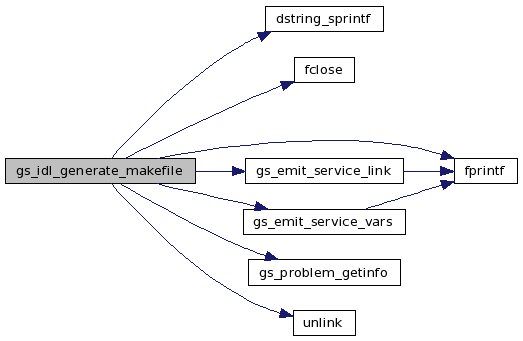

| int gs_idl_generate_source | ( | gs_problem_t * | problem | ) |
This generates the source code which calls the underlying routine implemented by the user (and, of course, represented by the IDL).
- Parameters:
-
problem -- The problem struct representing the routine to be called.
- Returns:
- 0 on success, -1 on failure.
Definition at line 385 of file problem_compile.c.
{
char *fname, *language, *problem_name;
gs_argument_t *arg, *lastarg;
int i, argcount;
FILE *file;
if(!problem)
return -1;
language = gs_problem_getinfo(problem, "LANGUAGE", "C");
/* generate source code for the interface */
fname = dstring_sprintf("%s/service/%s/%s_service.c",
gridsolve_root, problem->name,
problem->name);
if(!fname) {
ERRPRINTF("Could not generate name of service file\n");
return -1;
}
DBGPRINTF("Generating source for %s in file %s\n", problem->name, fname);
if((file = fopen(fname, "w")) == NULL) {
ERRPRINTF("Could not open file %s\n", fname);
free(fname);
return -1;
}
free(fname);
fprintf(file, "#include <stdio.h>\n");
fprintf(file, "#include <stdlib.h>\n");
fprintf(file, "#include <unistd.h>\n");
fprintf(file, "\n");
fprintf(file, "#include \"problem.h\"\n");
fprintf(file, "\n");
problem_name = gs_idl_emit_fortran_ifdefs(file, problem->name, language);
if(!problem_name)
return -1;
for(lastarg = problem->arglist; lastarg && lastarg->next;
lastarg = lastarg->next)
/* spin */ ;
if(problem->type == GS_FUNCTION && !lastarg) {
ERRPRINTF("Error: expected non-null last argument for function\n");
return -1;
}
/* emit the prototype for the user's function that will be called */
if(problem->type == GS_SUBROUTINE)
fprintf(file, "extern void %s(", problem_name);
else
fprintf(file, "extern %s %s %s(", gs_c_datatype[lastarg->datatype],
(lastarg->objecttype == GS_SCALAR) ? " " : "*", problem_name);
for(argcount = 0, arg = problem->arglist; arg != NULL;
arg = arg->next, argcount++) {
arg->prob = problem;
/* if this problem has a return value and we're on the last arg, don't
emit it since it's not part of the routine's calling sequence. */
if((problem->type == GS_FUNCTION) && (arg->next == NULL)) {
argcount++;
break;
}
/* if this is passed by value (i.e. a C input-only scalar argument) then
do not declare as pointer in the prototype. */
if(!strcasecmp(language, "C") && arg->objecttype == GS_SCALAR &&
((arg->inout == GS_IN) || (arg->inout == GS_WORKSPACE)))
fprintf(file, "%s %s", gs_c_datatype[arg->datatype], arg->name);
else if(arg->inout == GS_VAROUT)
fprintf(file, "%s** %s", gs_c_datatype[arg->datatype], arg->name);
else
fprintf(file, "%s* %s", gs_c_datatype[arg->datatype], arg->name);
if(problem->type == GS_FUNCTION) {
if(arg->next && arg->next->next)
fprintf(file, ", ");
}
else if(arg->next) {
fprintf(file, ", ");
}
if((argcount % 4) == 0)
fprintf(file, "\n ");
}
fprintf(file, ");\n");
fprintf(file, "\n");
/* start emitting service routine and generate variable declarations */
fprintf(file, "int gs_problem_service(gs_problem_t *problem) /* %s */ \n",
problem->name);
fprintf(file, "{ \n");
fprintf(file, " gs_argument_t *arg; \n");
fprintf(file, " void *argdata[%d]; \n", argcount);
fprintf(file, " int i; \n");
if(problem->type == GS_FUNCTION)
fprintf(file, " gs_argument_t *lastarg;\n");
fprintf(file, "\n");
if(problem->type == GS_FUNCTION)
fprintf(file, " lastarg=problem->arglist;\n");
/* set up the array of arguments from the linked list */
fprintf(file, " for(arg=problem->arglist,i=0; arg!=NULL; \
arg=arg->next,i++) {\n");
fprintf(file, " argdata[i] = arg->data;\n");
if(problem->type == GS_FUNCTION)
fprintf(file, " if(!arg->next) lastarg = arg;\n");
fprintf(file, " }\n");
fprintf(file, "\n");
if((problem->type == GS_FUNCTION) && (lastarg->objecttype == GS_SCALAR))
fprintf(file, " lastarg->data = (%s*)malloc(sizeof(%s));\n",
gs_c_datatype[lastarg->datatype],
gs_c_datatype[lastarg->datatype]);
/* now emit the call to the user's routine */
if(problem->type == GS_FUNCTION) {
if(lastarg->objecttype == GS_SCALAR)
fprintf(file, " *((%s*)(lastarg->data)) = %s(",
gs_c_datatype[lastarg->datatype], problem_name);
else
fprintf(file, " lastarg->data = %s(", problem_name);
}
else
fprintf(file, " %s(", problem_name);
free(problem_name);
for(i = 0, arg = problem->arglist; arg != NULL; arg = arg->next, i++) {
char *carg;
/* if this problem has a return value and we're on the last arg, don't
emit it since it's not part of the routine's calling sequence. */
if((problem->type == GS_FUNCTION) && (arg->next == NULL))
break;
carg = gs_idl_arg_name_mangle(arg, language, i);
if(carg) {
fprintf(file, "%s", carg);
free(carg);
}
else {
ERRPRINTF("gs_idl_arg_name_mangle failed\n");
fclose(file);
return -1;
}
if(problem->type == GS_FUNCTION) {
if(arg->next && arg->next->next)
fprintf(file, ", ");
}
else if(arg->next) {
fprintf(file, ", ");
}
if((i % 4) == 0)
fprintf(file, "\n ");
}
fprintf(file, ");\n");
fprintf(file, " return 0;\n");
fprintf(file, "} \n");
/* Set up main program to call service_template */
fprintf(file, "\n");
fprintf(file, "\n");
fprintf(file, "/* The service_template routine is defined in the */\n");
fprintf(file, "/* problem directory and is compiled into a library */\n");
fprintf(file, "/* and linked in. It sets up some stuff, and then */\n");
fprintf(file, "/* calls the gs_problem_service above */ \n");
fprintf(file, "int service_template(int argc, char *argv[]); \n");
fprintf(file, "\n");
fprintf(file, "int gs_argc;\n");
fprintf(file, "char **gs_argv;\n");
fprintf(file, "\n");
fprintf(file, "int main(int argc, char *argv[]) \n");
fprintf(file, "{ \n");
fprintf(file, " gs_argc = argc;\n");
fprintf(file, " gs_argv = argv;\n");
fprintf(file, " return service_template(argc, argv); \n");
fprintf(file, "} \n");
fprintf(file, "\n");
fclose(file);
return 0;
}
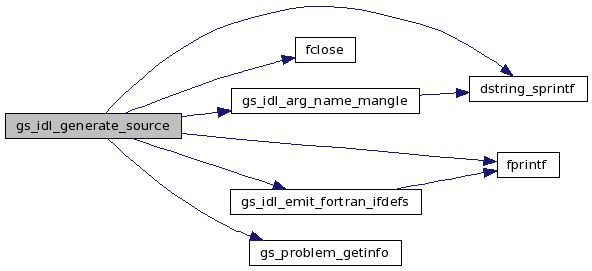

| int gs_idl_parse_and_compile | ( | char * | idlfile | ) |
This parses and compiles all routines found in the specified IDL file.
- Parameters:
-
idlfile -- The name of the file containing the IDL.
- Returns:
- 0 on success, -1 on failure.
Definition at line 1441 of file problem_compile.c.
{
FILE *fin = NULL;
int status = -1;
/* Used by the lexer and parser */
extern gs_problem_t *problemp;
extern int idl_parse();
extern FILE *idl_in;
if(!idlfile)
return -1;
if((fin = fopen(idlfile, "r")) == NULL) {
ERRPRINTF("Could not open idl file: %s \n", idlfile);
return -1;
}
DBGPRINTF("Calling parser\n");
idl_in = fin;
status = idl_parse();
fclose(fin);
idl_lexer_free_memory();
if(status != 0)
return -1;
status = gs_idl_check_problems(problemp);
if(status < 0) {
gs_free_problem(problemp);
return -1;
}
status = gs_idl_compile_problems(problemp);
gs_free_problem(problemp);
return status;
}


| int gs_idl_remove_directory | ( | char * | suffix | ) |
This function removes the directory with the following name: $GRIDSOLVE_ROOT/service/<suffix>
- Parameters:
-
suffix -- Directory name to append to the default.
- Returns:
- 0 on success, -1 on failure.
Definition at line 927 of file problem_compile.c.
{
char *fname;
struct stat stbuf;
struct dirent *dp;
char *entry;
DIR *dirp;
int max;
if(!suffix)
return -1;
fname = calloc((strlen(gridsolve_root) + strlen("/service/") +
+ (suffix ? strlen(suffix) + 1 : 0) + 1), sizeof(char));
sprintf(fname, "%s", gridsolve_root);
/* quick return if the root directory doesn't exist */
if(stat(fname, &stbuf) < 0)
return 0;
sprintf(fname, "%s/service%s%s", gridsolve_root,
suffix ? "/" : "", suffix ? suffix : "");
/* quick return if the service directory doesn't exist */
if(stat(fname, &stbuf) < 0)
return 0;
dirp = opendir(fname);
if(!dirp)
return -1;
/* find the longest file name so we can allocate the proper size
* array to hold the fully-qualified name.
*/
max = 0;
while ((dp = readdir(dirp)) != NULL)
if(strlen(dp->d_name) > max)
max = strlen(dp->d_name);
rewinddir(dirp);
/* now remove each file in the service directory */
if(max > 0) {
entry = (char *)malloc(strlen(fname) + max + 2);
if(!entry) return -1;
while ((dp = readdir(dirp)) != NULL)
{
if(strcmp(".", dp->d_name) && strcmp("..", dp->d_name))
{
sprintf(entry, "%s/%s", fname, dp->d_name);
if(unlink(entry) < 0)
{
perror("unlink");
free(entry);
return -1;
}
}
}
free(entry);
}
(void)closedir(dirp);
/* finally remove the service directory itself */
if(rmdir(fname) < 0)
return -1;
free(fname);
return 0;
}


| int gs_non_workspace_args_left | ( | gs_argument_t * | arg | ) |
Determines whether there are any non-workspace arguments remaining in an arg list (anywhere following the current argument). This is useful for printing a comma-separated list since we need to append a comma after each arg, but not if the only args following this arg are workspace args.
- Parameters:
-
arg -- the argument
- Returns:
- TRUE if this is the last non-workspace argument in the list; FALSE otherwise.
Definition at line 148 of file problem_compile.c.
{
gs_argument_t *atmp;
for(atmp = arg->next; atmp != NULL; atmp = atmp->next) {
if(atmp->inout != GS_WORKSPACE)
return FALSE;
}
return TRUE;
}

| int main | ( | int | argc, | |
| char * | argv[] | |||
| ) |
This is the main entry point for the GS_problem_compile program.
- Parameters:
-
argc -- The number of args (passed in by OS). argv -- The arguments (passed in by OS).
- Returns:
- Exits with EXIT_SUCCESS on success and EXIT_FAILURE on failure.
Definition at line 1575 of file problem_compile.c.
{
int i, failure = 0;
char **idlfiles;
if(gs_idl_compiler_parse_cmd_line(argc, argv, &idlfiles,
&gs_remove_failed_service) < 0) {
ERRPRINTF("%s\n", GS_COMPILER_USAGE_STR);
exit(EXIT_FAILURE);
}
if(!(gridsolve_root = getenv("GRIDSOLVE_ROOT")))
gridsolve_root = GRIDSOLVE_TOP_BUILD_DIR;
if(!gridsolve_root) {
ERRPRINTF("Error: GRIDSOLVE_ROOT could not be set. ");
ERRPRINTF("Please check the environment variables.\n");
exit(EXIT_FAILURE);
}
for(i=0;idlfiles[i];i++) {
if(gs_idl_parse_and_compile(idlfiles[i]) < 0) {
ERRPRINTF("Failed to compile '%s'\n", idlfiles[i]);
failure = 1;
}
}
if(failure) {
ERRPRINTF("Some IDL files could not be compiled \n");
ERRPRINTF("Possible problems Check the environment variables especially GRIDSOLVE_ROOT.\n");
ERRPRINTF("GridSolve expects to find files in $GRIDSOLVE_ROOT/include and $GRIDSOLVE_ROOT/lib\n");
}
/* temporarily return SUCCESS always. when we add the capability
* to parse the enabled problems from server_config, we should
* change this back so that failures are fatal.
*/
/* exit(failure ? EXIT_FAILURE : EXIT_SUCCESS); */
exit(EXIT_SUCCESS);
}
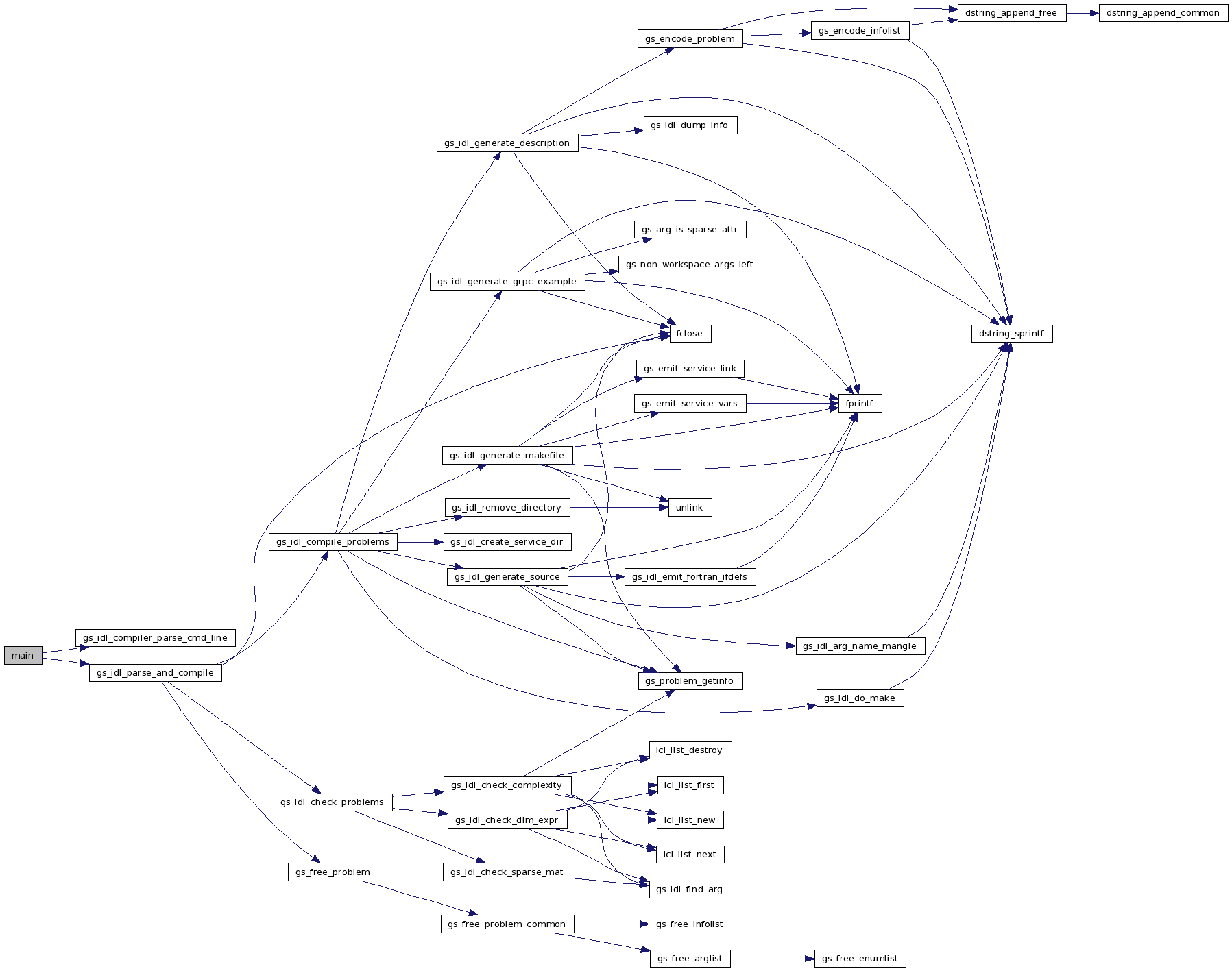
Variable Documentation
| char* gridsolve_root = NULL |
Global variable to hold gridsolve_root
Definition at line 35 of file problem_compile.c.
| int gs_remove_failed_service = TRUE |
Flag specifying whether to remove failed service subdirectories
Definition at line 38 of file problem_compile.c.
 1.6.3-20100507
1.6.3-20100507